外研版九年级下册 Module 3 Life now and then 单词课件 (共40张PPT)
文档属性
| 名称 | 外研版九年级下册 Module 3 Life now and then 单词课件 (共40张PPT) | 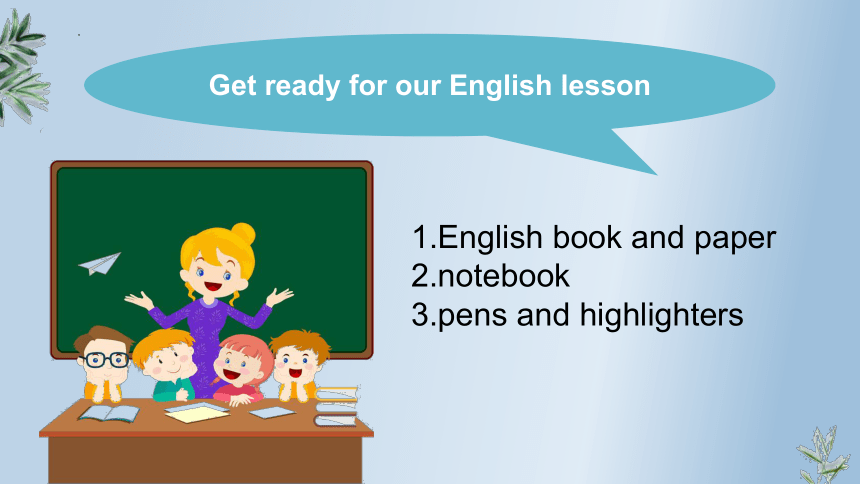 | |
| 格式 | zip | ||
| 文件大小 | 34.7MB | ||
| 资源类型 | 教案 | ||
| 版本资源 | 外研版 | ||
| 科目 | 英语 | ||
| 更新时间 | 2022-10-12 15:35:26 | ||
图片预览

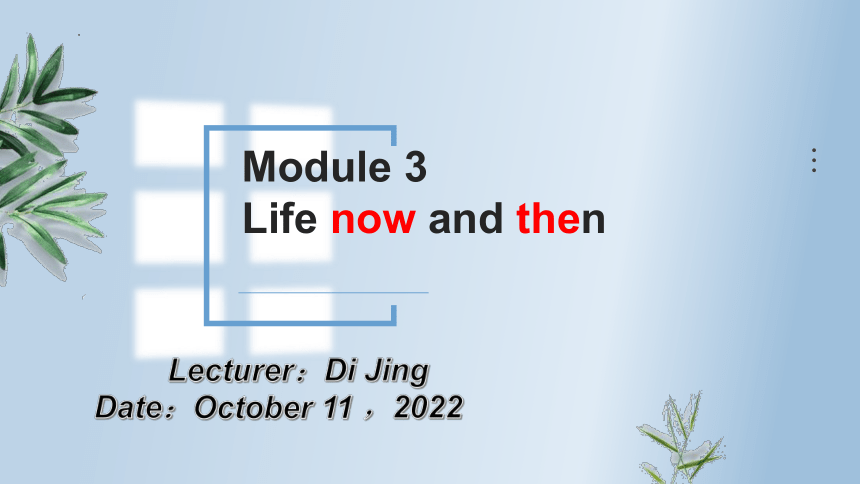
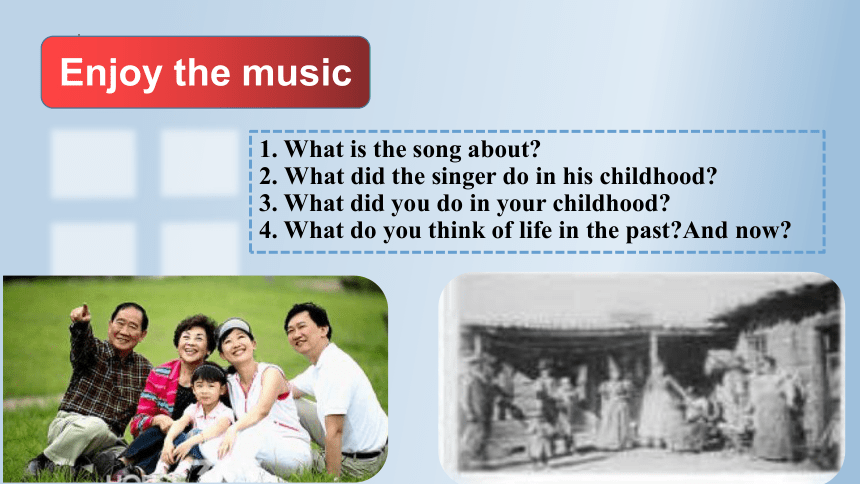
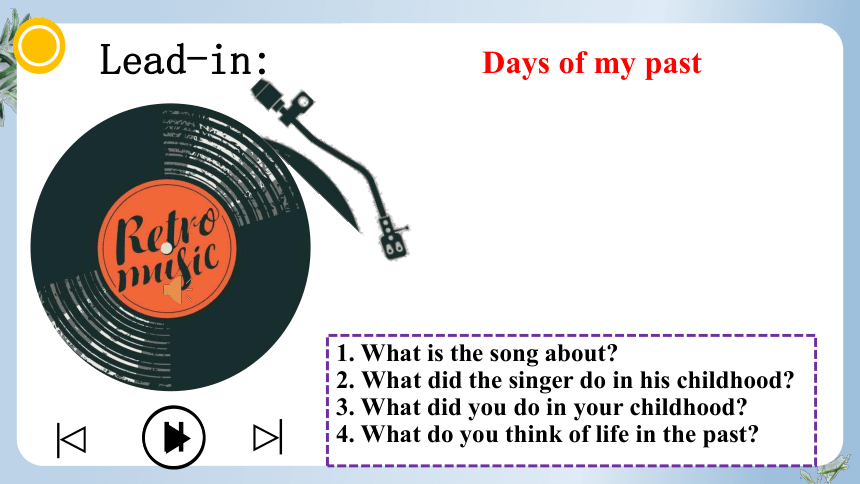


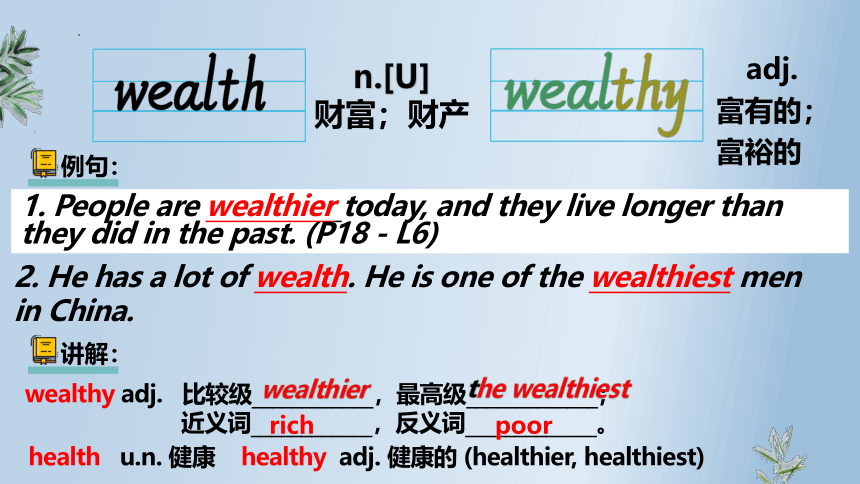
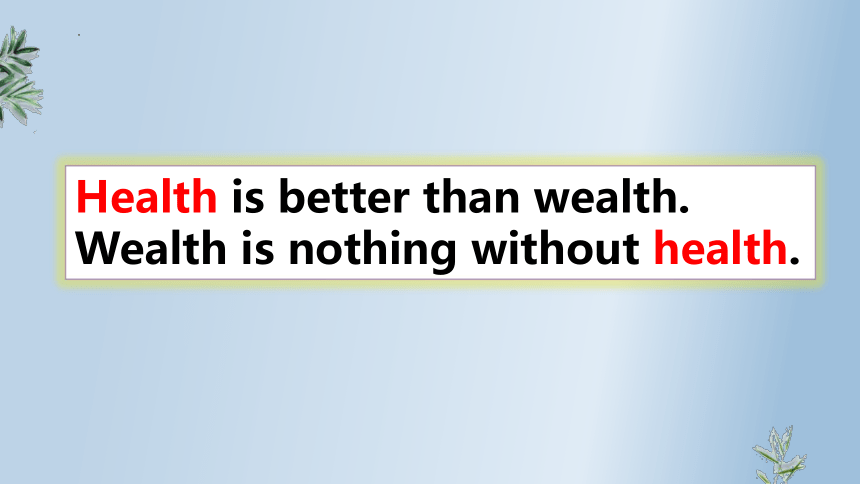
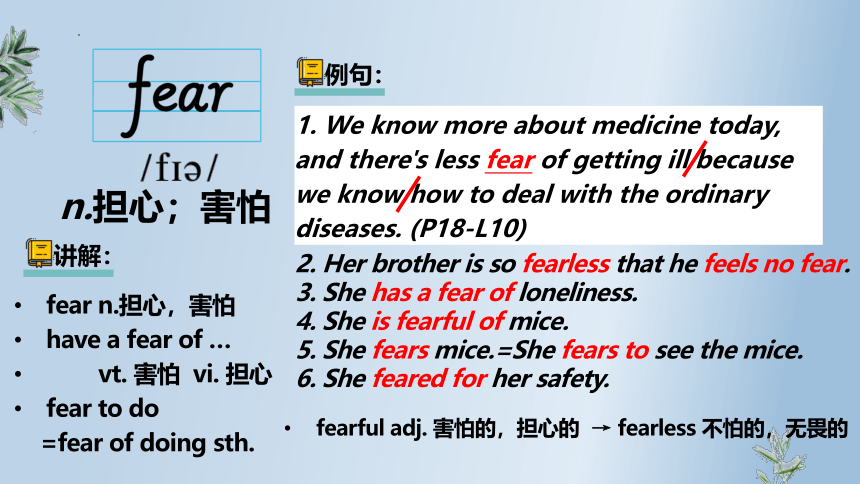
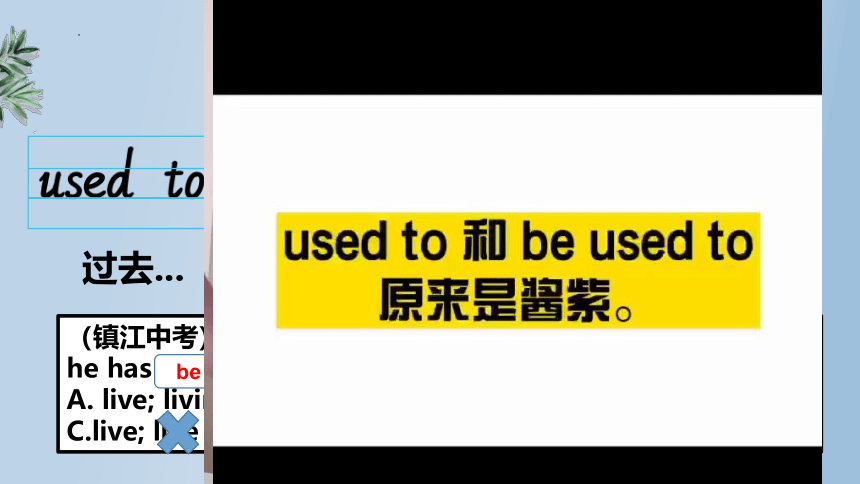
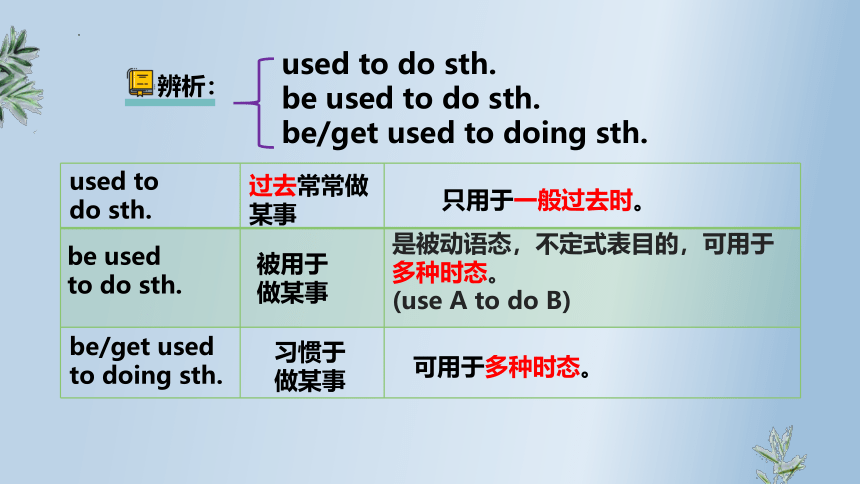
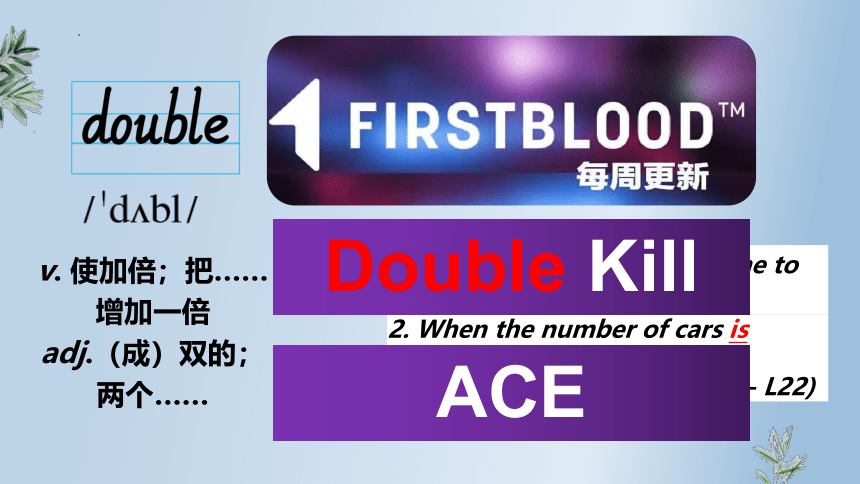
文档简介
(共40张PPT)
1.English book and paper
2.notebook
3.pens and highlighters
Get ready for our English lesson
Module 3
Life now and then
Lecturer:Di Jing
Date:October 11 ,2022
1. What is the song about
2. What did the singer do in his childhood
3. What did you do in your childhood
4. What do you think of life in the past And now
Enjoy the music
I recall when I was young oh
I will play and always having fun
With the neighbor next to me
And we'll play until the setting sun
Try to be the best among the others
In a game call the spider battle
It doesn't matter who is the best now
Those were the days of my past
Few years later when I got to school
And was late for lesson all the time
Always day dreaming in the class till
I don't even know the lesson's done
Then my teacher always tell
Me never ever be lazy again
What can I do now
What can I say now
Those the days of my past
As the days go on and on
I grew up and had my first love
Candle light and sandy beach
Finally give away my first kiss
Mother said I was too young to
Fall in love and then I will one day regret
So love was over but I do miss her
Those were the days of my past
Days of my past
Lead-in:
1. What is the song about
2. What did the singer do in his childhood
3. What did you do in your childhood
4. What do you think of life in the past
1. What is the song about
2. What did the singer do in his childhood
3. What did you do in your childhood
4. What do you think of life in the past And now
Every coin has two sides.
Everything has advantages and disadvantages.
We have a China Dream!
Let's work together
to achieve the China Dream.
Learning Objectives:
To learn the important words and expressions in Module 3.
Key words:
wealth role
double education
seldom speak up
spare used to
1. People are wealthier today, and they live longer than they did in the past. (P18 - L6)
2. He has a lot of wealth. He is one of the wealthiest men in China.
例句:
讲解:
adj.
富有的;
富裕的
n.[U]
财富;财产
wealthy adj. 比较级____________,最高级_____________;
近义词____________,反义词_____________。
health u.n. 健康 healthy adj. 健康的 (healthier, healthiest)
wealthier
the wealthiest
rich
poor
Health is better than wealth.
Wealth is nothing without health.
n.担心;害怕
例句:
1. We know more about medicine today, and there's less fear of getting ill because we know how to deal with the ordinary diseases. (P18-L10)
讲解:
2. Her brother is so fearless that he feels no fear.
3. She has a fear of loneliness.
4. She is fearful of mice.
5. She fears mice.=She fears to see the mice.
6. She feared for her safety.
fear n.担心,害怕
have a fear of …
vt. 害怕 vi. 担心
fear to do
=fear of doing sth.
fearful adj. 害怕的,担心的 → fearless 不怕的,无畏的
过去...
用来表示过去存在的某种状态或过去某种经常性、习惯性的行为,并暗含着这种情况目前已不复存在。
used to + do(V原)
People don't take as much exercise as they used to. (P18-L13)
例句:
(镇江中考)He used to ______ in a small village, but now he has been used to ______ in the big city.
A. live; living B. living; living
C.live; live D.living; live
讲解:
be used to doing sth.
used to do sth.
A
used to do sth.
be used to do sth.
be/get used to doing sth.
used to
do sth.
be used
to do sth.
be/get used to doing sth.
过去常常做某事
被用于
做某事
习惯于
做某事
可用于多种时态。
是被动语态,不定式表目的,可用于多种时态。
(use A to do B)
只用于一般过去时。
辨析:
v. 使加倍;把……增加一倍
adj.(成)双的;两个……
(2) vt. 使加倍;把……增加一倍
2. When the number of cars is doubled, the pollution is also doubled, or even worse. (P18 - L22)
(1) adj. (成)双的;两个……
1. We will give you double time to finish the work.
讲解:
例句:
Double Kill
ACE
adv. 很少地;
不常
用于情态动词、be动词、助动词之后,实义动词之前。
1. People seldom say they have
enough spare time!(P18-L29)
seldom 表示否定意义
2. He’s seldom been late for school,
has he
讲解:
例句:
注意:
出现在反意疑问句中时,附加疑问部分应用肯定形式。
adj.空余的;备用的
业余时间;闲暇
(1) adj. 空余的;备用的
1. People seldom say they have enough spare time!
(P18-L29)
(2) v. 抽出(时间);留出
spare sth. for sb.=spare sb. sth. 为某人腾出某物
2. We can spare a room for you if you want to stay.
= We can spare you a room if you want to stay.
讲解:
例句:
Remember to speak up! She's a bit deaf now.
(P18-P36)
不及物动词短语
讲解:
例句:
adj. 微小的;极小的
1. My family lived in a tiny house.
(P20-L5)
例句:
比较级_________,最高级__________。
讲解:
tinier
tiniest
2. My little sister is very lovely.
3. The apple is small.
tiny, little与small
辨析:
tiny
little
small
微小的;
极小的
小的
小的;
小号的
多指尺寸、面积、规模等的小。
多指“小巧的”,带有感彩,含有喜爱、可怜之意。
强调特别小。
电
adj.用电的
n.电,电力
n.电 子
adj.电子的
adj. 用电的,电动的
讲解:
例句:
/ lektr k /
electric的相关词
2. The machine is run by electricity.
1. There were no electric lights, only candles. (P20-L5)
3. electronic book/music
electricity
electric
electron
electronic
adj. 用电的,电动的
/ lektr k /
electricity
electric
electric
n. 电灯
(1) n.[C] 电灯
1. There were no electric lights, only
candles. (P20-L5)
(2) n.[U] 光;光线
2. Light travels faster than sound.
(3) adj. 轻的;浅色的;明亮的
3. This bag is light and easy to carry.
(4) v. 点燃
4. Please light the candles.
讲解:
例句:
n. 寒冷;冷空气
(3)
My father was a postman, and he often worked twelve hours a day outside in the winter cold or in the summer heat.(P20-L6)
(1)n.[U] 寒冷;冷空气
(2) n.[C] 感冒;着凉
How cold it is today! I can’t stand the cold. I’m afraid I’ll catch a cold.
讲解:
例句:
串记:
adj. 冷的,反义词hot
catch/have a cold 感冒
n. 高温;热度
(1) n. 高温;热度
(2) v. 加热;变热
2. You’d better heat the dish before eating.
讲解:
例句:
1. My father was a postman, and he often worked twelve hours a day outside in the winter cold or in the summer heat.(P20-L6)
n. 作用;职责;角色
play a role of … 扮演……的角色
2. In this new movie, he played a role of
a pilot.
短语:
例句:
1. The role of woman has changed too.(P20-L22)
3. Everyone should play a role in making
our environment better.
play a role in (doing)…
在……中发挥作用或承担职责
1.English book and paper
2.notebook
3.pens and highlighters
Get ready for our English lesson
用电的,电动的adj.
富有的
adj.
教育
使加倍
vt.
运输业
n.
很少地;不常
担心,害怕
过去
v.aux.
Review check
1.transport
2.used to
3.electric
4.education
5.seldom
6.double
7.wealthy
8.fear
n. (个人的)教育;学业
常用作不可数名词,但有时也可与a/an连用。
She has a good education, and she goes to work even after getting married.(P20-L23)
讲解:
例句:
拓展:
educate
educated
education
educator
教育
v.教育,教导
adj.受教育的
adj.教育的, 有教育意义的
n.教育家,
教育工作者
n.教育
educational
n. 运输业;交通
Transport and travel are much more convenient today.(P20-L23)
例句:
拓展:
transportation
n.交通运输系统;运输工具,交通方式
Topic. 02
Phrases
____________________几乎;差不多 = ___________
____________________了解关于…的情况
____________________ 很少害怕
____________________ 生病
____________________ 做锻炼 = ____________________
____________________ 过去常常做某事;_______________ 曾经有
____________________ 猜想;认为;____________认为某人是
____________________ 应该做某事=should do sth.
e.g. You are not supposed to play basketball here.
____________________ 那是因为…
____________________ 那就是…的原因
Unit1 They sometimes work harder.
nearly = almost
know about ...
There is less fear of
get ill
take /do exercise play sports
used to do sth. There used to be
suppose that+从句 suppose sb. to be
be supposed to do sth.
That's because…
That's why…
______________ +可数名词复数 “…的数量(数目、人数)”,
其作主语时,谓语动词用_______。
______________ +可数名词复数 “许多的”,
其作主语时,谓语动词用_______。
______________ = ______________ = ______________
在某人的业余时间
______________ 大点声说
______________ 失聪的人 ______________ 盲人
Unit1 They sometimes work harder.
the number of
单数
a number of
复数
in one's free time=in one's spare time=when sb. be free
speak up
the deaf the blind
______________ 终生,一辈子 ______________ 整天
______________ 整年
____________________________
无论是寒冷的冬天还是火热的夏天
______________ 一位慈祥的妈妈
______________ 出去工作
_____________ 一份全职工作 _____________ 一份兼职工作
______________ 有足够的钱做某事
______________ 买得起某物
______________ 而且;更重要的是
Unit 2-Unit3 I think life is better today.
all one's life all day (long)
all the year round
in the winter cold or in the summer heat
a loving mother
go out to work
a full-time job a part-time job
afford to do sth.
afford to buy sth.
what's more
__________________________ 在(干)某事上起作用
__________________ 接受良好的教育
__________________ 与某人结婚
__________________ 高兴/乐意做某事
________________ = ________________ 忙于(做)某事
_________ 可是,不过;然而 (位于句末)
__________________ = __________________ 一般而言
__________ adj. 令人满意的 _________adj. 感到满意的
_________________ … 对…满意
__________ v. 使……满意
Unit 2-Unit3 I think life is better today.
play a role/part in (doing) sth.
have a good education
be/get married to sb.
be happy/glad to do sth.
be busy doing sth. = be busy with sth.
though
generally speaking = in general
satisfying satisfied
be satisfied with
satisfy
破译长难句
Please find out the long and difficult sentences in Unit 2.(P20)
1. My father was a postman, and he often worked twelve hours a day outside in the winter cold or in summer heat.
2. My mum was a farm girl before she met my father.
3. There were five children in my family, and looking after us was more than a full-time job.
4. I wasn’t sent to school because my family could’t afford it, and what’s more because I was a girl.
5. Families have got smaller than they were in the past.
before
and
and
because
and
than
我的父亲是个邮递员,他经常一天在外面冒着冬日严寒或夏日酷暑工作12小时。
我妈妈在遇见我父亲之前是一个农村女孩。
我家有5个孩子,照顾我们比做一份全职工作更辛苦。
我没被送去上学因为我的家里供不起,更重要的是,因为我是一个女孩。
家庭比过去更小了。
1.English book and paper
2.notebook
3.pens and highlighters
Get ready for our English lesson
破译长难句
Please find out the long and difficult sentences in Unit 2.(P20)
6. I’m happy to see she’s busy working every day, but sometimes I feel lonely because she can’t come to see me often.
7. When I was young, I went everywhere on foot or sometimes by bike.
8. The only thing I don’t like, though, is that there’s so much more traffic.
9. There are some things that she is not happy with, for example, the traffic.
because
When
but
that
看到她每天忙于工作我很开心,但有时我会感到寂寞,因为她不能经常来看我。
我年轻时,去每个地方都步行或有时骑自行车。
然而,我唯一不喜欢的事情是车辆更多了。
有一些让她不高兴的事情,比如,交通。
破译长难句
Please find out the long and difficult sentences in Unit 3.(P23-P25)
1. Instead of the green, open countryside, people lived in very small houses, very close to each other, with no space for children to play.
2. Many children started work in factories when they were only four or five years old.
3. There were so many horses in large cities that it was almost impossible to get rid of the manure.
4. Modern people are used to the idea that cars cause pollution, but the first cars actually made cities cleaner!
when
so
that
that
人们住在拥挤的、没有地方供孩子们玩耍的很小的房子里,而不是绿树环绕而又开阔的乡村。
很多孩子在他们仅仅四五岁时就开始在工厂工作了。
大都市有如此多的马,以至于几乎不可能清除掉粪便。
现代人类习惯认为汽车引起了污染,但是第一批汽车实际上让城市更干净!
Ⅱ.用括号所给词的适当形式填空
You are supposed ( close ) the windows . Why were you so careless
-She must be your sister .
-I remember ( see ) her once .
Things are much ____________(light) on the moon than on the earth.
( read ) more books is good for the students .
We can't afford ( buy ) such a big house .
I was late for class because my bike was broken. What's ________ (many), I got up late this morning.
The sun gives us light and ( hot ) .
You can answer all the questions ( correct ) .
A good ( educate ) can be the gate way to success .
Edison was a great ______________ (invent). He _______________ (invent) so many ___________ (invent)since he was a child.
to close
seeing
lighter
Reading
to buy
more
heat
correctly
education
inventor
has invented
inventions
Ⅲ.选词填空
as a result ; have ; speak up ; care ; spare time more than ; double ; be supposed to ; used to ; old
You have to _____________ because the students in the back can’t hear you.
He doesn’t work hard. ____________, he doesn’t study well.
Mr Smith is _____________ a teacher. Most of his pupils think of him as their friend.
Now John works _______________ than before. His parents are proud of him.
When the number of cars ___________, the pollution is even worse.
In China students __________________ greet the teachers when classes begin.
Liu Huan, a famous singer, has long hair , because he is used to __________long hair.
Mike _________live in London , but now he works in China .
Mary's _______ brother is a doctor. He is four years _____ than her.
We do not have much ___________because we have important exams this year.
speak up
As a result
more than
more carefully
is doubled
are supposed to
having
used to
elder
older
spare time
Ⅳ.根据首字母完成短文
Dear Christine,
You asked me for h about your school project —the lives of children in Victorian Britain. I was also i . I s online and found o the following.
In Victorian Britain, t of people came to the cities to work in the factories. I of the green, open countryside, people lived in very small houses, very close to each other, with no
s for children to play. Families in those days were quite big. Often, there were four or five children in one family, and they all had to sleep in houses of just two rooms. S , a whole street had to s one outside toilet. Can you imagine that
Most of the big cities were dirty and unhealthy. The pollution from factories f the air. People put their rubbish outside in the streets. A a result, there were many i .
elp
nterested
earched
ut
housands
nstead
pace
ometimes
hare
illed
s
llnesses
And life was h for children in those t . They didn't always go to school, because they had to work instead. Many children started work in factories when they were only four or five years old. They worked twelve hours a day in dangerous jobs for very little money. Many were h in accidents with machines.
I hope this is helpful. Write to me if you need more information.
With love,
Gran
arder
imes
urt
1. Remember the key words and useful expressions.
背默重点词汇及用法(建议听写);
2. Preview the vocabularies in Module 4 “蒙面人”U1对话,录制音视频通过钉钉家校本上传。
Homework
1.English book and paper
2.notebook
3.pens and highlighters
Get ready for our English lesson
Module 3
Life now and then
Lecturer:Di Jing
Date:October 11 ,2022
1. What is the song about
2. What did the singer do in his childhood
3. What did you do in your childhood
4. What do you think of life in the past And now
Enjoy the music
I recall when I was young oh
I will play and always having fun
With the neighbor next to me
And we'll play until the setting sun
Try to be the best among the others
In a game call the spider battle
It doesn't matter who is the best now
Those were the days of my past
Few years later when I got to school
And was late for lesson all the time
Always day dreaming in the class till
I don't even know the lesson's done
Then my teacher always tell
Me never ever be lazy again
What can I do now
What can I say now
Those the days of my past
As the days go on and on
I grew up and had my first love
Candle light and sandy beach
Finally give away my first kiss
Mother said I was too young to
Fall in love and then I will one day regret
So love was over but I do miss her
Those were the days of my past
Days of my past
Lead-in:
1. What is the song about
2. What did the singer do in his childhood
3. What did you do in your childhood
4. What do you think of life in the past
1. What is the song about
2. What did the singer do in his childhood
3. What did you do in your childhood
4. What do you think of life in the past And now
Every coin has two sides.
Everything has advantages and disadvantages.
We have a China Dream!
Let's work together
to achieve the China Dream.
Learning Objectives:
To learn the important words and expressions in Module 3.
Key words:
wealth role
double education
seldom speak up
spare used to
1. People are wealthier today, and they live longer than they did in the past. (P18 - L6)
2. He has a lot of wealth. He is one of the wealthiest men in China.
例句:
讲解:
adj.
富有的;
富裕的
n.[U]
财富;财产
wealthy adj. 比较级____________,最高级_____________;
近义词____________,反义词_____________。
health u.n. 健康 healthy adj. 健康的 (healthier, healthiest)
wealthier
the wealthiest
rich
poor
Health is better than wealth.
Wealth is nothing without health.
n.担心;害怕
例句:
1. We know more about medicine today, and there's less fear of getting ill because we know how to deal with the ordinary diseases. (P18-L10)
讲解:
2. Her brother is so fearless that he feels no fear.
3. She has a fear of loneliness.
4. She is fearful of mice.
5. She fears mice.=She fears to see the mice.
6. She feared for her safety.
fear n.担心,害怕
have a fear of …
vt. 害怕 vi. 担心
fear to do
=fear of doing sth.
fearful adj. 害怕的,担心的 → fearless 不怕的,无畏的
过去...
用来表示过去存在的某种状态或过去某种经常性、习惯性的行为,并暗含着这种情况目前已不复存在。
used to + do(V原)
People don't take as much exercise as they used to. (P18-L13)
例句:
(镇江中考)He used to ______ in a small village, but now he has been used to ______ in the big city.
A. live; living B. living; living
C.live; live D.living; live
讲解:
be used to doing sth.
used to do sth.
A
used to do sth.
be used to do sth.
be/get used to doing sth.
used to
do sth.
be used
to do sth.
be/get used to doing sth.
过去常常做某事
被用于
做某事
习惯于
做某事
可用于多种时态。
是被动语态,不定式表目的,可用于多种时态。
(use A to do B)
只用于一般过去时。
辨析:
v. 使加倍;把……增加一倍
adj.(成)双的;两个……
(2) vt. 使加倍;把……增加一倍
2. When the number of cars is doubled, the pollution is also doubled, or even worse. (P18 - L22)
(1) adj. (成)双的;两个……
1. We will give you double time to finish the work.
讲解:
例句:
Double Kill
ACE
adv. 很少地;
不常
用于情态动词、be动词、助动词之后,实义动词之前。
1. People seldom say they have
enough spare time!(P18-L29)
seldom 表示否定意义
2. He’s seldom been late for school,
has he
讲解:
例句:
注意:
出现在反意疑问句中时,附加疑问部分应用肯定形式。
adj.空余的;备用的
业余时间;闲暇
(1) adj. 空余的;备用的
1. People seldom say they have enough spare time!
(P18-L29)
(2) v. 抽出(时间);留出
spare sth. for sb.=spare sb. sth. 为某人腾出某物
2. We can spare a room for you if you want to stay.
= We can spare you a room if you want to stay.
讲解:
例句:
Remember to speak up! She's a bit deaf now.
(P18-P36)
不及物动词短语
讲解:
例句:
adj. 微小的;极小的
1. My family lived in a tiny house.
(P20-L5)
例句:
比较级_________,最高级__________。
讲解:
tinier
tiniest
2. My little sister is very lovely.
3. The apple is small.
tiny, little与small
辨析:
tiny
little
small
微小的;
极小的
小的
小的;
小号的
多指尺寸、面积、规模等的小。
多指“小巧的”,带有感彩,含有喜爱、可怜之意。
强调特别小。
电
adj.用电的
n.电,电力
n.电 子
adj.电子的
adj. 用电的,电动的
讲解:
例句:
/ lektr k /
electric的相关词
2. The machine is run by electricity.
1. There were no electric lights, only candles. (P20-L5)
3. electronic book/music
electricity
electric
electron
electronic
adj. 用电的,电动的
/ lektr k /
electricity
electric
electric
n. 电灯
(1) n.[C] 电灯
1. There were no electric lights, only
candles. (P20-L5)
(2) n.[U] 光;光线
2. Light travels faster than sound.
(3) adj. 轻的;浅色的;明亮的
3. This bag is light and easy to carry.
(4) v. 点燃
4. Please light the candles.
讲解:
例句:
n. 寒冷;冷空气
(3)
My father was a postman, and he often worked twelve hours a day outside in the winter cold or in the summer heat.(P20-L6)
(1)n.[U] 寒冷;冷空气
(2) n.[C] 感冒;着凉
How cold it is today! I can’t stand the cold. I’m afraid I’ll catch a cold.
讲解:
例句:
串记:
adj. 冷的,反义词hot
catch/have a cold 感冒
n. 高温;热度
(1) n. 高温;热度
(2) v. 加热;变热
2. You’d better heat the dish before eating.
讲解:
例句:
1. My father was a postman, and he often worked twelve hours a day outside in the winter cold or in the summer heat.(P20-L6)
n. 作用;职责;角色
play a role of … 扮演……的角色
2. In this new movie, he played a role of
a pilot.
短语:
例句:
1. The role of woman has changed too.(P20-L22)
3. Everyone should play a role in making
our environment better.
play a role in (doing)…
在……中发挥作用或承担职责
1.English book and paper
2.notebook
3.pens and highlighters
Get ready for our English lesson
用电的,电动的adj.
富有的
adj.
教育
使加倍
vt.
运输业
n.
很少地;不常
担心,害怕
过去
v.aux.
Review check
1.transport
2.used to
3.electric
4.education
5.seldom
6.double
7.wealthy
8.fear
n. (个人的)教育;学业
常用作不可数名词,但有时也可与a/an连用。
She has a good education, and she goes to work even after getting married.(P20-L23)
讲解:
例句:
拓展:
educate
educated
education
educator
教育
v.教育,教导
adj.受教育的
adj.教育的, 有教育意义的
n.教育家,
教育工作者
n.教育
educational
n. 运输业;交通
Transport and travel are much more convenient today.(P20-L23)
例句:
拓展:
transportation
n.交通运输系统;运输工具,交通方式
Topic. 02
Phrases
____________________几乎;差不多 = ___________
____________________了解关于…的情况
____________________ 很少害怕
____________________ 生病
____________________ 做锻炼 = ____________________
____________________ 过去常常做某事;_______________ 曾经有
____________________ 猜想;认为;____________认为某人是
____________________ 应该做某事=should do sth.
e.g. You are not supposed to play basketball here.
____________________ 那是因为…
____________________ 那就是…的原因
Unit1 They sometimes work harder.
nearly = almost
know about ...
There is less fear of
get ill
take /do exercise play sports
used to do sth. There used to be
suppose that+从句 suppose sb. to be
be supposed to do sth.
That's because…
That's why…
______________ +可数名词复数 “…的数量(数目、人数)”,
其作主语时,谓语动词用_______。
______________ +可数名词复数 “许多的”,
其作主语时,谓语动词用_______。
______________ = ______________ = ______________
在某人的业余时间
______________ 大点声说
______________ 失聪的人 ______________ 盲人
Unit1 They sometimes work harder.
the number of
单数
a number of
复数
in one's free time=in one's spare time=when sb. be free
speak up
the deaf the blind
______________ 终生,一辈子 ______________ 整天
______________ 整年
____________________________
无论是寒冷的冬天还是火热的夏天
______________ 一位慈祥的妈妈
______________ 出去工作
_____________ 一份全职工作 _____________ 一份兼职工作
______________ 有足够的钱做某事
______________ 买得起某物
______________ 而且;更重要的是
Unit 2-Unit3 I think life is better today.
all one's life all day (long)
all the year round
in the winter cold or in the summer heat
a loving mother
go out to work
a full-time job a part-time job
afford to do sth.
afford to buy sth.
what's more
__________________________ 在(干)某事上起作用
__________________ 接受良好的教育
__________________ 与某人结婚
__________________ 高兴/乐意做某事
________________ = ________________ 忙于(做)某事
_________ 可是,不过;然而 (位于句末)
__________________ = __________________ 一般而言
__________ adj. 令人满意的 _________adj. 感到满意的
_________________ … 对…满意
__________ v. 使……满意
Unit 2-Unit3 I think life is better today.
play a role/part in (doing) sth.
have a good education
be/get married to sb.
be happy/glad to do sth.
be busy doing sth. = be busy with sth.
though
generally speaking = in general
satisfying satisfied
be satisfied with
satisfy
破译长难句
Please find out the long and difficult sentences in Unit 2.(P20)
1. My father was a postman, and he often worked twelve hours a day outside in the winter cold or in summer heat.
2. My mum was a farm girl before she met my father.
3. There were five children in my family, and looking after us was more than a full-time job.
4. I wasn’t sent to school because my family could’t afford it, and what’s more because I was a girl.
5. Families have got smaller than they were in the past.
before
and
and
because
and
than
我的父亲是个邮递员,他经常一天在外面冒着冬日严寒或夏日酷暑工作12小时。
我妈妈在遇见我父亲之前是一个农村女孩。
我家有5个孩子,照顾我们比做一份全职工作更辛苦。
我没被送去上学因为我的家里供不起,更重要的是,因为我是一个女孩。
家庭比过去更小了。
1.English book and paper
2.notebook
3.pens and highlighters
Get ready for our English lesson
破译长难句
Please find out the long and difficult sentences in Unit 2.(P20)
6. I’m happy to see she’s busy working every day, but sometimes I feel lonely because she can’t come to see me often.
7. When I was young, I went everywhere on foot or sometimes by bike.
8. The only thing I don’t like, though, is that there’s so much more traffic.
9. There are some things that she is not happy with, for example, the traffic.
because
When
but
that
看到她每天忙于工作我很开心,但有时我会感到寂寞,因为她不能经常来看我。
我年轻时,去每个地方都步行或有时骑自行车。
然而,我唯一不喜欢的事情是车辆更多了。
有一些让她不高兴的事情,比如,交通。
破译长难句
Please find out the long and difficult sentences in Unit 3.(P23-P25)
1. Instead of the green, open countryside, people lived in very small houses, very close to each other, with no space for children to play.
2. Many children started work in factories when they were only four or five years old.
3. There were so many horses in large cities that it was almost impossible to get rid of the manure.
4. Modern people are used to the idea that cars cause pollution, but the first cars actually made cities cleaner!
when
so
that
that
人们住在拥挤的、没有地方供孩子们玩耍的很小的房子里,而不是绿树环绕而又开阔的乡村。
很多孩子在他们仅仅四五岁时就开始在工厂工作了。
大都市有如此多的马,以至于几乎不可能清除掉粪便。
现代人类习惯认为汽车引起了污染,但是第一批汽车实际上让城市更干净!
Ⅱ.用括号所给词的适当形式填空
You are supposed ( close ) the windows . Why were you so careless
-She must be your sister .
-I remember ( see ) her once .
Things are much ____________(light) on the moon than on the earth.
( read ) more books is good for the students .
We can't afford ( buy ) such a big house .
I was late for class because my bike was broken. What's ________ (many), I got up late this morning.
The sun gives us light and ( hot ) .
You can answer all the questions ( correct ) .
A good ( educate ) can be the gate way to success .
Edison was a great ______________ (invent). He _______________ (invent) so many ___________ (invent)since he was a child.
to close
seeing
lighter
Reading
to buy
more
heat
correctly
education
inventor
has invented
inventions
Ⅲ.选词填空
as a result ; have ; speak up ; care ; spare time more than ; double ; be supposed to ; used to ; old
You have to _____________ because the students in the back can’t hear you.
He doesn’t work hard. ____________, he doesn’t study well.
Mr Smith is _____________ a teacher. Most of his pupils think of him as their friend.
Now John works _______________ than before. His parents are proud of him.
When the number of cars ___________, the pollution is even worse.
In China students __________________ greet the teachers when classes begin.
Liu Huan, a famous singer, has long hair , because he is used to __________long hair.
Mike _________live in London , but now he works in China .
Mary's _______ brother is a doctor. He is four years _____ than her.
We do not have much ___________because we have important exams this year.
speak up
As a result
more than
more carefully
is doubled
are supposed to
having
used to
elder
older
spare time
Ⅳ.根据首字母完成短文
Dear Christine,
You asked me for h about your school project —the lives of children in Victorian Britain. I was also i . I s online and found o the following.
In Victorian Britain, t of people came to the cities to work in the factories. I of the green, open countryside, people lived in very small houses, very close to each other, with no
s for children to play. Families in those days were quite big. Often, there were four or five children in one family, and they all had to sleep in houses of just two rooms. S , a whole street had to s one outside toilet. Can you imagine that
Most of the big cities were dirty and unhealthy. The pollution from factories f the air. People put their rubbish outside in the streets. A a result, there were many i .
elp
nterested
earched
ut
housands
nstead
pace
ometimes
hare
illed
s
llnesses
And life was h for children in those t . They didn't always go to school, because they had to work instead. Many children started work in factories when they were only four or five years old. They worked twelve hours a day in dangerous jobs for very little money. Many were h in accidents with machines.
I hope this is helpful. Write to me if you need more information.
With love,
Gran
arder
imes
urt
1. Remember the key words and useful expressions.
背默重点词汇及用法(建议听写);
2. Preview the vocabularies in Module 4 “蒙面人”U1对话,录制音视频通过钉钉家校本上传。
Homework
同课章节目录
- Module 1 Travel
- Unit 1 We toured the city by bus and by taxi
- Unit 2 It's a long story.
- Unit 3 Language in use
- Module 2 Education
- Unit 1 They don't sit in rows.
- Unit 2 What do I like best about school?
- Unit 3 Language in use
- Module 3 Life now and then
- Unit 1 They sometimes work harder.
- Unit 2 I think life is better today.
- Unit 3 Language in use.
- Module 4 Rules and suggestions
- Unit 1 You must be careful of falling stones.
- Unit 2 we must keep the camp clean.
- Unit 3 Language in use.
- Revison A
- Module 5 Look after yourself
- Unit 1 We'd better get you to hospital.
- Unit 2 Get off the sofa!
- Unit 3 Language in use.
- Module 6 Eating togethe
- Unit 1 When is the school-leavers' party?
- Unit 2 Knives and forks are used for most Western
- Unit 3 Language in use
- Module 7 English for you and me
- Unit 1 Have you ever been to an English corner?
- Unit 2 We all own English.
- Unit 3 Language in use
- Module 8 My future life
- Unit 1 Here's to our friendship and the future
- Unit 2 I know that you will be better at maths.
- Unit 3 Language in use
- Revison B
